wimpel69
01-09-2019, 12:45 PM
To receive the FLAC links (incl. covers & booklets), please request them in this thread.
Private messages will be ignored. These are my own rips.
"Highly recommended for the exciting performances and exceptional audio quality."
All Music
In addition to the 7 Symphonies (incl. both the original & revised versions of No.4),
the set also contains the following works:
Sinfonietta, op.5
Dreams, op.6
Autumnal Sketch
Symphonic Fragment
Cantata for the 20th Anniversary of the October Revolution, op.74
Kirill Karabits is a Ukrainian conductor, the son of the composer and conductor Ivan Karabits. A student of piano and
composition from his youth, Karabits became interested in conducting at the age of 13. He studied at the Lysenko Music School
in Kiev and the National Tchaikovsky Music Academy before moving to Vienna, where he studied at the Vienna Music College,
earning his diploma for orchestral conducting in 2000. He continued his studies with Helmuth Rilling and Peter Gulke at the
International Bach Academy in Stuttgart. From 1998 to 2000, he was the assistant conductor of the Budapest Festival
Orchestra, and from 2002 to 2005 he served as associate conductor of the Radio France Philharmonic Orchestra.
He conducted the Strasbourg Philharmonic Orchestra from 2005 to 2007. Starting in 2006, Karabits also guest
conducted the Bournemouth Symphony Orchestra, and after several appearances, became its principal conductor
in 2009, with a contract projected to 2018. As of the 2016-2017 season, he also became the general music director and
chief conductor for the Deutsches Nationaltheater and the Staatskapelle Weimar. Karabits has recorded for Onyx Classics,
Naxos, Decca, and Haenssler, among other labels.
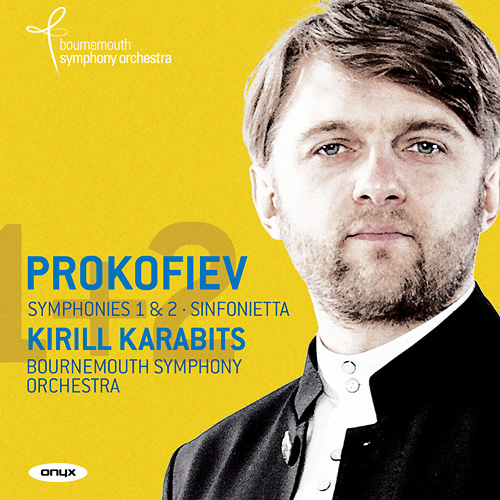
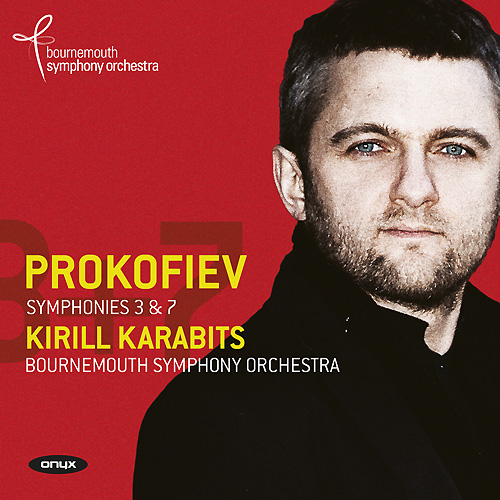
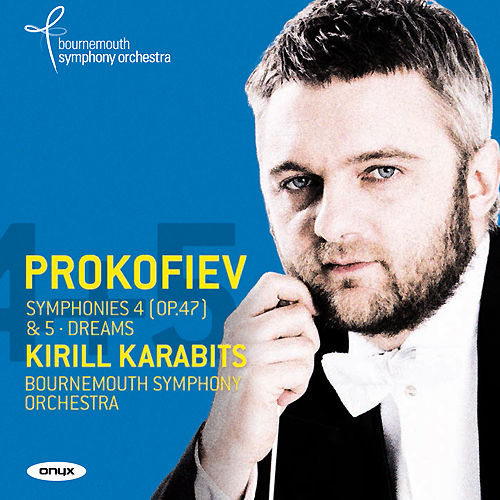
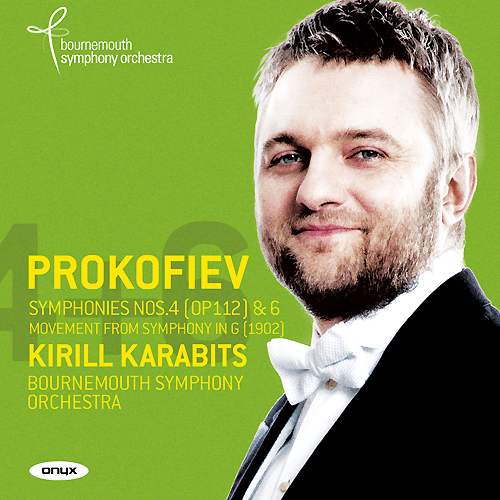
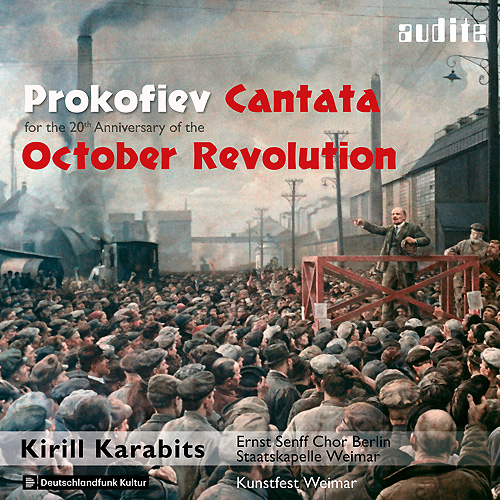
Music Composed by
Sergei Prokofiev
Played by the
Bournemouth Symphony Orchestra
Staatskapelle Weimar
With the
Ernst-Senff Chor Berlin
Conducted by
Kirill Karabits
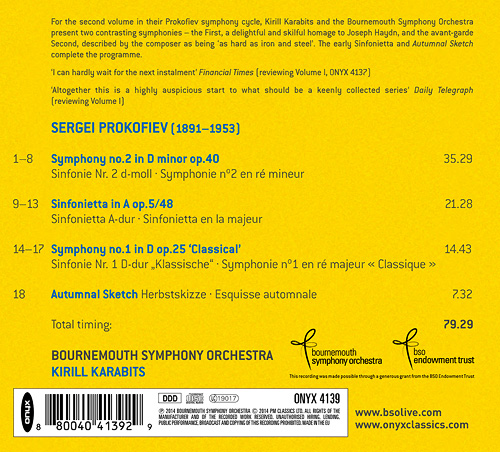
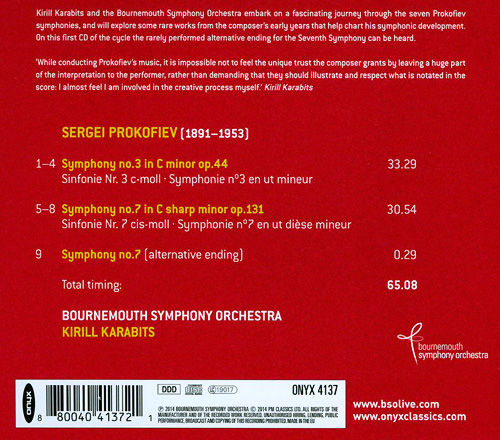
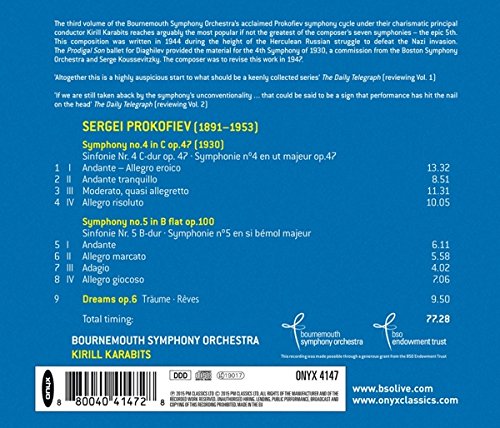
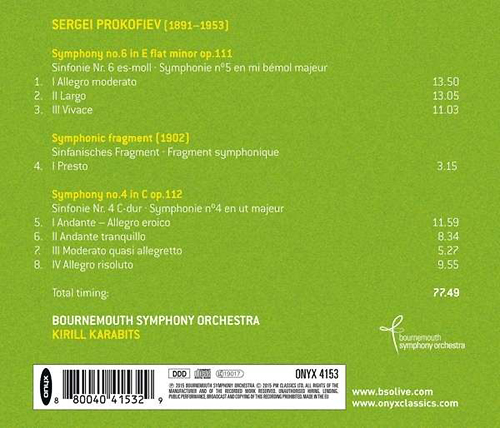
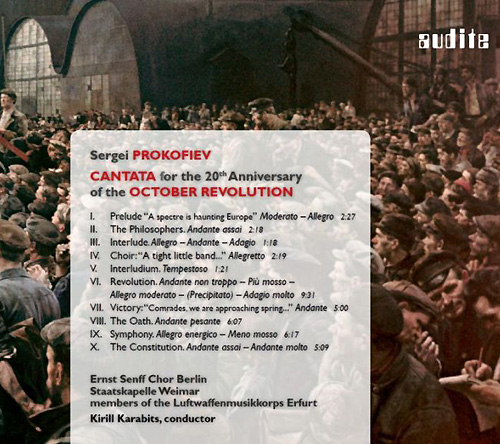
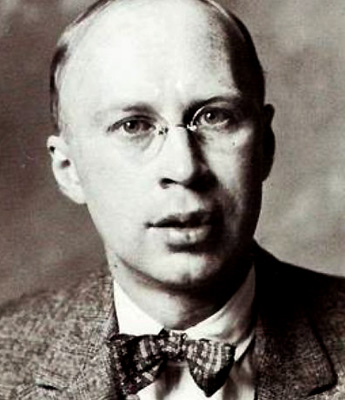
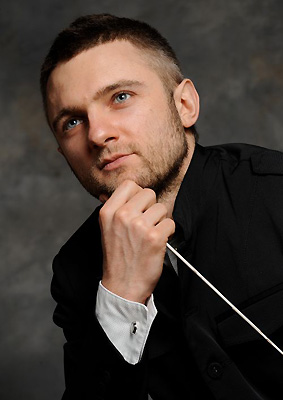
"Of the seven symphonies of Sergey Prokofiev, the Symphony No. 1 in D major, "Classical," is the clear favorite, and it is sure to help this volume in Kirill Karabits' cycle for Onyx sell well. However, listeners who know that this cheerful piece is a tribute to Haydn and utterly unlike the rest of Prokofiev's symphonies will be inclined to investigate further and discover other aspects of his music in the Symphony No. 2 in D minor, the Sinfonietta in A major, and the Autumnal Sketch. Karabits and the Bournemouth Symphony Orchestra acquitted themselves admirably in their first volume of the series with the Third and Seventh symphonies, giving exciting performances with exceptional sound, and this second volume follows suit. Naturally, they give the "Classical" Symphony a charming performance, and they impart a little of the same feeling to the bright, neo-classical Sinfonietta, an early work that is rather similar in flavor. But the Symphony No. 2 provides a startling contrast in its astringent character and uncompromising complexity and dissonant textures, which mark it as one of Prokofiev's most avant-garde works of the 1920s. Yet anyone already familiar with Prokofiev's output will recognize his personality in it, and concede that it has more originality than the "Classical" Symphony displays. The closing piece, Autumnal Sketch, offers moody scene painting that strikes a curious balance between austere harmonies and lush orchestration."
All Music
"The seven symphonies of Sergey Prokofiev vary in popularity, and only the Symphony No. 1, "Classical" and the Symphony No. 5 are uncontested favorites. Somewhat less loved are the Symphony No. 3 in C minor (based on themes from the opera The Fiery Angel), and the Symphony No. 7 in C sharp minor, the last and possibly least understood of the cycle. These works seem as though they should be embraced by audiences because of their accessible tonality, memorable themes, and vibrantly colored sonorities, yet there has been some resistance to the Third's acidic dissonances and the Seventh's quizzical tone, aspects that are supposedly harder for listeners to appreciate. However, both works reward close study, and these live recordings by Kirill Karabits and the Bournemouth Symphony Orchestra are an excellent introduction to these under-performed classics. Karabits is recording the entire cycle for Onyx, and his choice of these symphonies for the first installment suggests that he encourages a reappraisal of Prokofiev's music, especially of the Third's attractive scoring and cinematic style, as well as the Seventh's straightforward development and soaring melodies. This is certainly an intelligent way to open a Prokofiev set, and Karabits adds value by including a recording of the original ending of the Seventh. (The rest of the recordings will feature Prokofiev rarities that are connected to the origins of the symphonies.) This volume is a promising beginning, and it is highly recommended for the exciting performances and exceptional audio quality."
All Music
"Soviet Russian works falling under the rubric of Socialist Realism lay fallow for many years as audiences naturally found them less interesting than music that seemed to suggest incipient freedoms. They've enjoyed a modest revival, however, partly because of the insight they offer into the personalities of their composers and their responses to the growing Stalinist menace. This Cantata for the 20th Anniversary of the October Revolution was written in 1936 and is nearly contemporaneous with Peter and the Wolf. Despite taking Marx (including "Philosophers have hitherto only interpreted the world in various ways; the point is to change it," from the Theses on Feuerbach), Lenin, and Stalin for texts and setting them with a good deal of undeniably enjoyable bombast, the music was still too forward-looking for Stalin's apparatchiks, and the work was not performed until 1966. It's not known exactly what they objected to; possibly the three orchestral interludes, much closer to the mainstream of Prokofiev's style, set them off. These are interesting in both content and placement, and you might sample the ninth track, labeled a "Symphony," to get an idea and also to encounter the strong performances by the Staatskapelle Weimar and Ernst Senff Chor Berlin under Kirill Karabits. Is there an X factor coming from having performances by former East Germans under a Ukrainian? Probably, and you get the blood and thunder in the revolutionary passages from members of the Luftwaffenmusikkorps Erfurt as well."
All Music
Source: Onyx & Audite CDs (My rips!)
Format: FLAC(WinRar), DDD Stereo
File Size: 1.51 GB (incl. covers & booklets)
To receive the FLAC links (incl. covers & booklets), please request them in this thread.
Private messages will be ignored. These are my own rips.
Please do not share any further and add to my reputation when convenient. :)
Private messages will be ignored. These are my own rips.
"Highly recommended for the exciting performances and exceptional audio quality."
All Music
In addition to the 7 Symphonies (incl. both the original & revised versions of No.4),
the set also contains the following works:
Sinfonietta, op.5
Dreams, op.6
Autumnal Sketch
Symphonic Fragment
Cantata for the 20th Anniversary of the October Revolution, op.74
Kirill Karabits is a Ukrainian conductor, the son of the composer and conductor Ivan Karabits. A student of piano and
composition from his youth, Karabits became interested in conducting at the age of 13. He studied at the Lysenko Music School
in Kiev and the National Tchaikovsky Music Academy before moving to Vienna, where he studied at the Vienna Music College,
earning his diploma for orchestral conducting in 2000. He continued his studies with Helmuth Rilling and Peter Gulke at the
International Bach Academy in Stuttgart. From 1998 to 2000, he was the assistant conductor of the Budapest Festival
Orchestra, and from 2002 to 2005 he served as associate conductor of the Radio France Philharmonic Orchestra.
He conducted the Strasbourg Philharmonic Orchestra from 2005 to 2007. Starting in 2006, Karabits also guest
conducted the Bournemouth Symphony Orchestra, and after several appearances, became its principal conductor
in 2009, with a contract projected to 2018. As of the 2016-2017 season, he also became the general music director and
chief conductor for the Deutsches Nationaltheater and the Staatskapelle Weimar. Karabits has recorded for Onyx Classics,
Naxos, Decca, and Haenssler, among other labels.





Music Composed by
Sergei Prokofiev
Played by the
Bournemouth Symphony Orchestra
Staatskapelle Weimar
With the
Ernst-Senff Chor Berlin
Conducted by
Kirill Karabits







"Of the seven symphonies of Sergey Prokofiev, the Symphony No. 1 in D major, "Classical," is the clear favorite, and it is sure to help this volume in Kirill Karabits' cycle for Onyx sell well. However, listeners who know that this cheerful piece is a tribute to Haydn and utterly unlike the rest of Prokofiev's symphonies will be inclined to investigate further and discover other aspects of his music in the Symphony No. 2 in D minor, the Sinfonietta in A major, and the Autumnal Sketch. Karabits and the Bournemouth Symphony Orchestra acquitted themselves admirably in their first volume of the series with the Third and Seventh symphonies, giving exciting performances with exceptional sound, and this second volume follows suit. Naturally, they give the "Classical" Symphony a charming performance, and they impart a little of the same feeling to the bright, neo-classical Sinfonietta, an early work that is rather similar in flavor. But the Symphony No. 2 provides a startling contrast in its astringent character and uncompromising complexity and dissonant textures, which mark it as one of Prokofiev's most avant-garde works of the 1920s. Yet anyone already familiar with Prokofiev's output will recognize his personality in it, and concede that it has more originality than the "Classical" Symphony displays. The closing piece, Autumnal Sketch, offers moody scene painting that strikes a curious balance between austere harmonies and lush orchestration."
All Music
"The seven symphonies of Sergey Prokofiev vary in popularity, and only the Symphony No. 1, "Classical" and the Symphony No. 5 are uncontested favorites. Somewhat less loved are the Symphony No. 3 in C minor (based on themes from the opera The Fiery Angel), and the Symphony No. 7 in C sharp minor, the last and possibly least understood of the cycle. These works seem as though they should be embraced by audiences because of their accessible tonality, memorable themes, and vibrantly colored sonorities, yet there has been some resistance to the Third's acidic dissonances and the Seventh's quizzical tone, aspects that are supposedly harder for listeners to appreciate. However, both works reward close study, and these live recordings by Kirill Karabits and the Bournemouth Symphony Orchestra are an excellent introduction to these under-performed classics. Karabits is recording the entire cycle for Onyx, and his choice of these symphonies for the first installment suggests that he encourages a reappraisal of Prokofiev's music, especially of the Third's attractive scoring and cinematic style, as well as the Seventh's straightforward development and soaring melodies. This is certainly an intelligent way to open a Prokofiev set, and Karabits adds value by including a recording of the original ending of the Seventh. (The rest of the recordings will feature Prokofiev rarities that are connected to the origins of the symphonies.) This volume is a promising beginning, and it is highly recommended for the exciting performances and exceptional audio quality."
All Music
"Soviet Russian works falling under the rubric of Socialist Realism lay fallow for many years as audiences naturally found them less interesting than music that seemed to suggest incipient freedoms. They've enjoyed a modest revival, however, partly because of the insight they offer into the personalities of their composers and their responses to the growing Stalinist menace. This Cantata for the 20th Anniversary of the October Revolution was written in 1936 and is nearly contemporaneous with Peter and the Wolf. Despite taking Marx (including "Philosophers have hitherto only interpreted the world in various ways; the point is to change it," from the Theses on Feuerbach), Lenin, and Stalin for texts and setting them with a good deal of undeniably enjoyable bombast, the music was still too forward-looking for Stalin's apparatchiks, and the work was not performed until 1966. It's not known exactly what they objected to; possibly the three orchestral interludes, much closer to the mainstream of Prokofiev's style, set them off. These are interesting in both content and placement, and you might sample the ninth track, labeled a "Symphony," to get an idea and also to encounter the strong performances by the Staatskapelle Weimar and Ernst Senff Chor Berlin under Kirill Karabits. Is there an X factor coming from having performances by former East Germans under a Ukrainian? Probably, and you get the blood and thunder in the revolutionary passages from members of the Luftwaffenmusikkorps Erfurt as well."
All Music
Source: Onyx & Audite CDs (My rips!)
Format: FLAC(WinRar), DDD Stereo
File Size: 1.51 GB (incl. covers & booklets)
To receive the FLAC links (incl. covers & booklets), please request them in this thread.
Private messages will be ignored. These are my own rips.
Please do not share any further and add to my reputation when convenient. :)